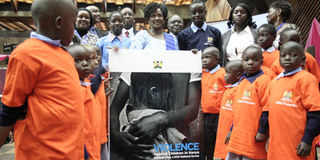Violence against children common in Kenya, says Unicef

Gender Minister Naomi Shaban is joined by children at the KICC on November 27, 2012, during the launch of the findings of a study on violence against children. A new report by Unicef indicates that male Kenyan children are more likely to be subjected to various forms of violence as compared to females. FILE PHOTO | NATION MEDIA GROUP
What you need to know:
- Kenyan male children were also more likely than female children to be subjected to violence.
- They are likely to have been slapped, pushed, punched, kicked, whipped or beaten using an object.
- Children who have been severely abused or neglected are often hampered in their development, the report adds.
- Belief in the need for physical punishment was also highest in Kenya.
NEW YORK/UNITED NATIONS
More than two-thirds of Kenyan children experience physical violence, the United Nations Children's Fund (Unicef) reported on Thursday.
The violence is mostly in the form of sexual abuse, with 11 per cent of girls and 18 per cent of boys reported to have been subject to “forced or coerced sex” or “unwanted sexual touching and unwanted attempted sex”.
Kenyan male children were also more likely than female children to have been slapped, pushed, punched, kicked, whipped or beaten using an object, Unicef said.
The figures for these types of violence are put at 66 per cent for girls and 73 per cent for boys.
Data for Kenya included in Unicef's report is drawn mainly from national surveys of men and women aged 18 to 24 years who were asked about their experiences prior to attaining the age of 18 years.
FUNDAMENTAL RIGHT
Protection of children from all forms of violence is a fundamental right guaranteed in international treaties, notes the Unicef report, titled Hidden in Plain Sight.
But violence against children is common around the world, with negative consequences not only for the abused individuals but also for the society as a whole, the report warns.
Children who have been severely abused or neglected are often hampered in their development, it adds.
“Unless we confront the reality each infuriating statistic represents — the life of a child whose right to a safe, protected childhood has been violated — we will never change the mind-set that violence against children is normal and permissible. It is neither,” said Unicef Director Anthony Lake.
The extent of violence against children in Kenya is roughly consistent with worldwide averages reported by Unicef.
PHYSICAL PUNISHMENT
But in a sampling of six nations included in the report, Kenya is found to have the highest rate of both mild and severe physical punishment of children.
In Kenya, the report states, almost all children received a mild form of physical discipline while nearly two-thirds were subjected to severe corporal punishment.
The five other countries included in this sample group are China, Colombia, Italy, the Philippines and Thailand.
"Mild" physical punishment is said to include spanking or hitting a child with a bare hand.
"Severe" physical punishment includes blows to the head and/or beating a child repeatedly with an object.
Belief in the need for physical punishment was also highest in Kenya, the report says.
CORPORAL PUNISHMENT
More than half of both mothers and fathers (56 per cent and 54 per cent, respectively) saw corporal punishment as required for raising their sons.
Rates were slightly less than half (44 per cent of mothers and 48 per cent of fathers) when it came to daughters.
Unicef also gauges what it refers to as "emotional violence" against children.
It is defined as “an adult saying or doing something on purpose to humiliate the child in front of others, making the child feel unwanted or threatening to abandon the child.”
About 30 per cent of young Kenyan men said in surveys that they had experienced this type of violence as children.
Slightly less than one-quarter of young Kenyan women reported being subject to emotional violence as children.
HUMILIATED BY TEACHERS
Both male and female young adults in Kenya were most likely to have been humiliated by teachers and neighbours.
“Males in Kenya were especially vulnerable to threats of abandonment by their fathers, with over half reporting this particular form of emotional abuse,” the report adds.
“Violence against children occurs every day, everywhere,” Mr Lake said.
But the Unicef chief was quick to point out that this scenario was not inevitable.
“It is preventable if we refuse to let violence remain in the shadows," he said.




